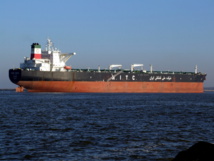According to British The Financial Times, Saudi Arabia and Bahrain are restricting access to Iranian vessels transporting oil in their ports. Experts believe that the countries take such steps in order to slow the growth of Iran's oil exports. After the lifting of sanctions against Iran, its volumes of oil sales has been growing. At the end of last week, Iranian Oil Minister Bijan Namdar Zanganeh said that Iran's oil exports has already exceeded 2 million barrels per day, while production has reached 3.2 million barrels per day. When the sanctions against Iran were in action, the country could not export more than 1 million barrels per day, and daily production was 2.8 million barrels. Nevertheless, Iranian oil exports to Europe so far has been quite modest. By mid-April, only eight tankers will depart from Iran; the volume of oil transported by them will amount to a total of 12 million barrels. One reason for the slow growth of Iranian gas supplies to Europe is the lack of access to infrastructure managed by Arab Petroleum Pipeline Company, primarily to Sumed pipeline in northern Egypt. 50% of the company belongs to Egypt, another 45% is jointly owned by Saudi Arabia, the UAE and Kuwait. According to some experts, Iran's access to the pipeline blocks namely Saudi Arabia.
Information that Saudi Arabia and Bahrain are preventing Iranian tankers from entering their ports was received from a circular sent out by a cargo insurance company. The document states that if an Iranian port was one of a ship’s last three destinations, the vessel needs to obtain permission of the Saudi and Bahraini authorities to enter their coastal waters. Representatives of Iranian oil companies have expressed their concern over the rumors. According to them, it becomes another problem on the way of Iranian oil export. According to a ship's broker quoted by The Financial Times: «It adds an unknown risk. Nobody wants to spoil relations with the Saudis. " According to Windward company, the amount of oil that is stored off the coast of Iran, has grown by 10 million barrels, and now stands at about 50 million barrels since the beginning of the year.
In mid-March, it became known that the OPEC countries and Russia will hold another meeting on freezing oil production on April 17. The meeting has been expected for several months, but so far, there is no certainty that the decision will supported by all the OPEC countries. Last week, Saudi Prince Mohammed bin Salman Al-Saud said that the country will not freeze production unless Iran agree to do the same. Earlier, Iran has repeatedly stated that it does not plan to freeze production up until it reaches the pre-sanctions level. Nevertheless, in late March, it was reported that Iran may join the freezing of oil production.
source: ft.com
Information that Saudi Arabia and Bahrain are preventing Iranian tankers from entering their ports was received from a circular sent out by a cargo insurance company. The document states that if an Iranian port was one of a ship’s last three destinations, the vessel needs to obtain permission of the Saudi and Bahraini authorities to enter their coastal waters. Representatives of Iranian oil companies have expressed their concern over the rumors. According to them, it becomes another problem on the way of Iranian oil export. According to a ship's broker quoted by The Financial Times: «It adds an unknown risk. Nobody wants to spoil relations with the Saudis. " According to Windward company, the amount of oil that is stored off the coast of Iran, has grown by 10 million barrels, and now stands at about 50 million barrels since the beginning of the year.
In mid-March, it became known that the OPEC countries and Russia will hold another meeting on freezing oil production on April 17. The meeting has been expected for several months, but so far, there is no certainty that the decision will supported by all the OPEC countries. Last week, Saudi Prince Mohammed bin Salman Al-Saud said that the country will not freeze production unless Iran agree to do the same. Earlier, Iran has repeatedly stated that it does not plan to freeze production up until it reaches the pre-sanctions level. Nevertheless, in late March, it was reported that Iran may join the freezing of oil production.
source: ft.com



















